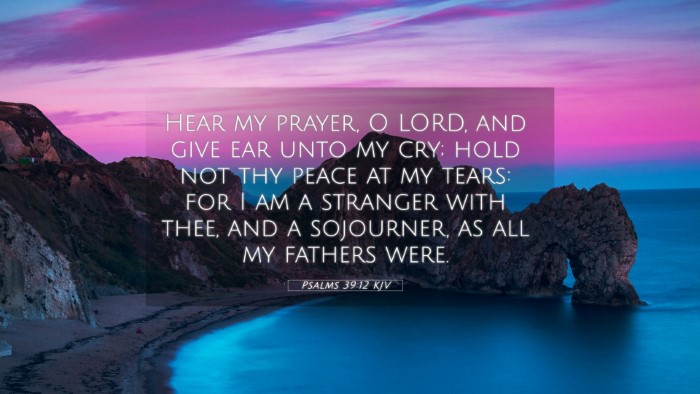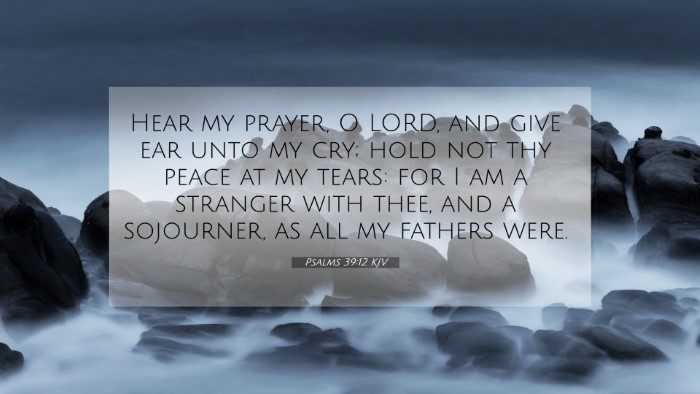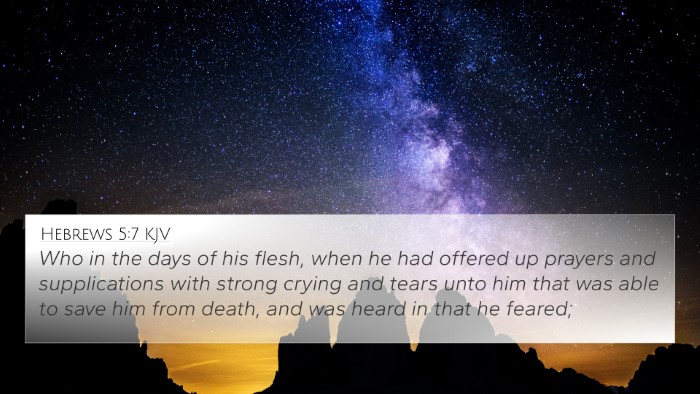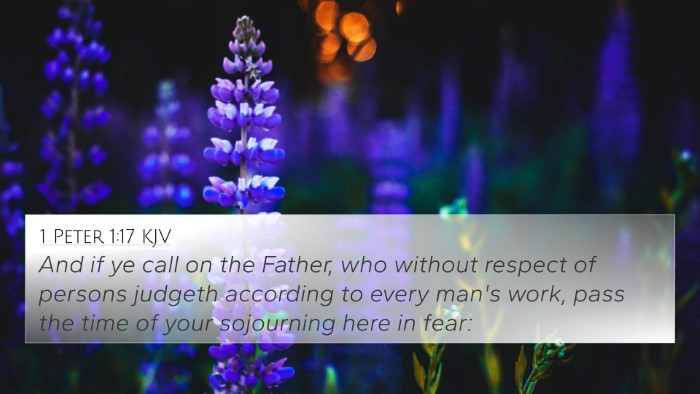Psalms 39:12 - Summary of Interpretation
Psalms 39:12 states, "Hear my prayer, O Lord, and give ear to my cry; do not be silent at my tears, for I am a sojourner with You, a guest like all my fathers." This verse embodies a profound plea for God’s attention amidst human frailty. The psalmist, traditionally understood to be David, reflects upon his transient existence as a mortal being.
The text can be interpreted through various lenses, shedding light on the themes of mortality, the desperation for God's presence, and the acknowledgement of life as a temporary journey.
Combined Insights from Public Domain Commentaries
-
Matthew Henry:
Matthew Henry emphasizes the earnestness of the psalmist’s plea. He highlights the importance of turning to God in times of trouble, urging believers to recognize their dependency on God. The invocation, "Hear my prayer," indicates the deep desire for divine attention that reflects the psalmist’s understanding of human vulnerability.
-
Albert Barnes:
Albert Barnes discusses the contextual background of the psalm, noting the feelings of isolation and suffering. He suggests that this cry is not just for help but also for acknowledgment, where the psalmist wishes for God to take notice of his plight. The reference to being a "sojourner" signifies that life is transient, prompting the faithful to seek God earnestly.
-
Adam Clarke:
Adam Clarke draws attention to the emotional depth of the verse. He interprets the mention of tears as a representation of human sorrow and the need for consolation which only God can provide. Clarke posits that the phrase "like all my fathers" connects personal suffering to the broader human experience, tying individual pain to the collective narrative of humanity’s reliance on God through time.
Key Themes and Concepts
-
Mortal Existence:
The acknowledgment of being a "sojourner" reflects on the ephemerality of life, a common theme in biblical texts. This concept invites readers to ponder their own lives and the divine relationship that provides stability amidst life’s uncertainties.
-
Divine Attention:
The plea for God’s ears to "give ear to my cry" underscores the importance of prayer and seeking divine help, suggesting that God’s awareness of our struggles is vital for spiritual well-being.
-
Emotional Vulnerability:
Tears symbolize the raw emotional state of the psalmist, reflecting the reality of human anguish and the inherent need for divine comfort and recognition.
Cross-References for Psalms 39:12
To enrich the understanding of Psalms 39:12, several Bible verses present interconnected themes. Here are 10 significant cross-references:
- Job 14:1-2: Discusses the frailty of human life, similar to the themes in Psalms 39.
- Hebrews 11:13: Refers to believers as strangers on Earth, parallel to the transient nature noted in Psalms 39:12.
- Psalms 51:17: Highlights the importance of a broken spirit, connecting to emotional vulnerability expressed in Psalms 39:12.
- Psalm 102:1-2: Another sincere plea for divine attention amidst distress.
- 1 Peter 2:11: Encourages believers to view themselves as sojourners, aligning with the message of Psalms 39.
- Psalms 90:10: Reflects on the shortness of life, resonating with the themes of mortality.
- Isaiah 53:3: Talks about the sorrowful state and need for comfort, akin to the sentiments in this Psalm.
- Psalms 6:6-7: Expresses deep sorrow and pleas for divine attention, echoing the emotions in Psalms 39:12.
- Philippians 3:20: Reminds believers of their citizenship in heaven, linking to the transient journey of life.
- James 4:14: Speaks on the fleeting nature of life, amplifying the themes within Psalms 39.
The Importance of Cross-Referencing Biblical Texts
Understanding the interconnections between Bible verses—such as those seen in Psalms 39:12—enhances one’s comprehension of Scripture as a cohesive narrative.
Engaging in comparative Bible verse analysis can deepen one’s faith and provide insight into the thematic links throughout God’s Word. Incorporating tools for Bible cross-referencing, a Bible concordance, and a Bible cross-reference guide can effectively facilitate this study.
Conclusion
Psalms 39:12 encourages believers to reach out to God in their time of need, recognizing life's transient nature and our reliance on divine presence. Through the insights of various commentators and the connections drawn from cross-referenced scriptures, we gain a more profound understanding of the emotional depth and spiritual truths within this verse. Such ongoing scriptural cross-referencing can notably enhance one’s study and appreciation of the Bible.


















